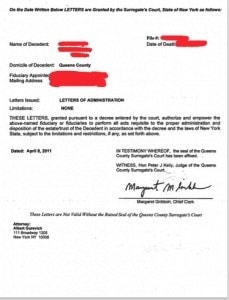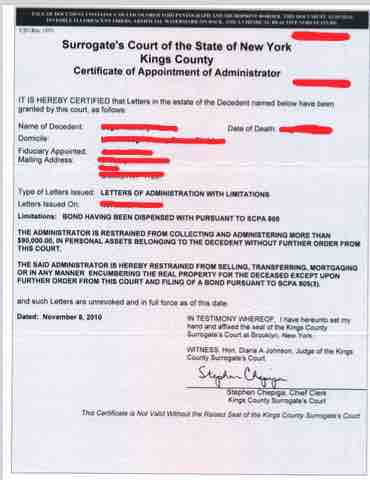What is a Letter of Administration? How Do I Get One?
A letter of administration is an informal name sometimes given to a document issued by the Surrogate’s Court which permits a person to act on behalf of an estate of a person who died without leaving a will. What is a letter of administration? The document is actually called Letters of Administration, and it’s not a letter – it’s a court order. The confusion stems from the fact that Order used to be called Letter hundreds of years ago.
To get a letter of administration, your attorney would file a petition with the probate court requesting it be issued. If you need to consult with an attorney, you can send us an email at [email protected] or call us at 212-233-1233.
Here is a redacted picture of a letter of administration obtained by our law firm:
What is a letter of administration? A letter of administration authorizes a person to act as a representative of an estate. They allow a person to perform the responsibilities of an estate. Here are some of the things a person can do once they are appointed as an administrator of an estate by a letter of administration issued by the Surrogate’s Court:
- Obtain a tax id number for an estate from the federal government
- Open an estate bank account
- Request information from banks and other institutions that control the decedent’s assets. The banks will comply if you show them the Letters of Administration and the death certificate
- Transfer assets from the decedent’s name to the name of the estate
- Pay debts of the decedent
- Collect claims of the decedent
- Marshal assets of the estate
- Distribute the estate assets to the beneficiaries of the estate, after obtaining proper waivers or providing an accounting
Those things would be impossible to do without a letter of administration. The banks will not give you information and will not transfer the assets, the county recorder will not record property deeds, and a buyer will not buy a property from you.
Certificates
You often need more than one, since each bank and government agency would require an original. Also, some institutions require a more official-looking document. This is why the court can also issue a Certificate of Appointment of Administrator, which is printed on a watermarked blue paper and looks similar to a death certificate, birth certificate or marriage certificate.
Here is a redacted picture of a Certificate of Appointment of Administrator obtained by our law firm:
Who Can Get a Letter of Administration
Letters of administration are issued when a person died without a will, to a person who applies and is appointed by the court as the administrator of a deceased person’s estate. A person can only be an administrator if they are related to the person who died. The spouse of the decedent gets a preference, followed by children, grandchildren, other descendants, parents, siblings, etc.
If a person died and no one stepped forward to be the administrator of their estate, then Letters of Administration will be issued to the Public Administrator of the county where the decedent lived.
How to Get a Letter of Administration
In order to get a letter of administration, you will need your estate attorney to apply for them through the Surrogate’s Court. Your attorney will need to submit the appropriate documents, which may include Petition for Administration of Estate, the original death certificate, notices and citations, copy of the funeral bill, affidavit of heirship, affidavit of family tree, affidavit of due diligence, etc.. There will be a hearing in the Surrogate’s Court whereby your candidacy for the Letters of Administration will be considered by the judge.
Ancillary Administration
Even if the decedent died in a different state, and you have Letters of Administration from that state, you will still need to obtain separate A letter of administration, by verifying out-of-state Letters of Administration through a New York ancillary administration proceeding.
How Long Does it Take
It typically takes a few months to get a letter of administration. If the administration proceeding is contested, i.e. if someone is contesting your right to become the estate administrator, then getting letters of administration can take years, or they can be potentially denied altogether, with either the challenger or the public administrator getting the letters instead. Although getting the letters is only one of the steps of New York administration proceeding, it is the most important step.
What if there is a will?
If the person who died left a will, then the document will be similar and with similar powers, but it will be called “Letters Testamentary,” and the Certificate will be called “Certificate of the Appointment of Executor.”
Call the Law Offices of Albert Goodwin at (212) 233-1233, New York estate, guardianship, wills, trust, Medicaid and probate lawyer, and make an appointment to discuss obtaining Letters of Administration.













